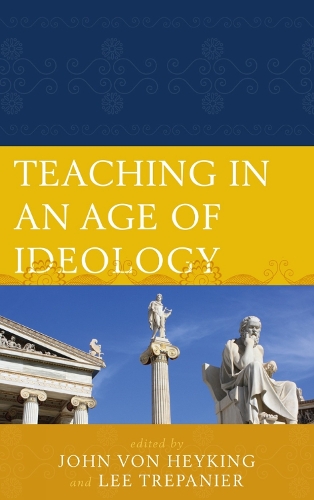
Teaching in an Age of Ideology
(Paperback)
Publishing Details
Teaching in an Age of Ideology
By (Author) Lee Trepanier
Edited by John von Heyking
Contributions by Leah Bradshaw
Contributions by Charles R. Embry
Contributions by Molly Brigid Flynn
Contributions by Bryan-Paul Frost
Contributions by Lance M. Grigg
Contributions by Michael Henry
Contributions by Tim Hoye
Contributions by Nalin Ranasinghe
Bloomsbury Publishing PLC
Lexington Books
9th June 2014
United States
Classifications
Professional and Scholarly
Non Fiction
Political science and theory
320.01
Physical Properties
Paperback
268
Width 155mm, Height 227mm, Spine 21mm
413g
Description
This volume explores the role of some of the most prominent twentieth-century philosophers and political thinkers as teachers. It examines how these teachers conveyed truth to their students against the ideological influences found in the university and society. Philosophers from Edmund Husserl and Hannah Arendt to political thinkers like Eric Voegelin and Leo Strauss, and their students such as Ellis Sandoz, Stanley Rosen, and Harvey Mansfield, are in this volume as teachers who analyze, denounce, and attempt to transcend ideology for a more authentic way of thinking. What the reader will discover is that teaching is not merely a matter of holding concepts together, but a way of existing or living in the world. The thinkers in this volume represent this form of teaching as the philosophical search for truth in a world deformed by ideology.
Reviews
There may be no formula on how to be an outstanding teacher, but this splendid collection, mostly by younger scholars, provide intimations, insights, and reflections on master teachers they have known. Great teaching always contains an element of resistance to the lie, to mere opinion, to deceitand is invariably based on common sense even while it aspires to something more. -- Barry Cooper, University of Calgary
I opened Teaching in an Age of Ideology to look for stories of great teachers I knew or had read, and quickly I was confronted with unsolved questions of political philosophy and liberal education. The stories are here, but often they are merely the hook to bring the reader virtually into the kind of classroom where he is compelled to upset his settled opinions and to see the world afresh. These essays by master teachers about master teachers are not only enjoyable and illuminating; taken as a whole, they offer a prcis of the great crises of the past century and an intimation of how the human spirit can transcend dark days. -- James R. Stoner, Jr., Louisiana State University
The largely realized promise of this collection is that the human activity of political-philosophical inquiry is exhibited and helpfully illuminated not merely in what philosophers and scholars write and publish, but in their acts of teaching. These thoughtful reflections on the teaching work of scholars deserve the attention of scholars and students alike. -- Thomas W. Heilke, University of Kansas
In this collection of essays celebrating 11 scholar-teachers who opposed today's dominant educational and political ideologies, and written by their students and followers, Heyking (Univ. of Lethbridge, Canada) and Trepanier (Saginaw Valley State Univ.) have constructed a biographical narrative of ideas that begins largely among secular Jewish philosophers in early-20th-century Europe and ends with conservative political theorists in US universities. From Edmund Husserl and Hannah Arendt in Germany through Eric Voegelin, Leo Strauss, and Harvey Mansfield in the US, the essays examine how and why their mentors shaped ways of thinking that are a form of reflective action that enhances both human freedom and democratic citizenship. Both as teachers and as scholars, they employed ways of doing political philosophy that became models of liberal education itself--models that now occupy proud but beleaguered outposts even within the liberal arts in most colleges and universities. At a time when "theory" in academic life is often a dogmatic barrier to everyday experience, shared meanings, and opening to transcendence, this collection echoes similar responses by Harry Clor in On Moderation: Defending an Ancient Virtue in a Modern World (CH, Jan'09, 46-2925) and David Walsh in After Ideology: Recovering the Spiritual Foundations of Freedom (1983). Summing Up: Recommended. Upper-division undergraduate, graduate, and research collections. * CHOICE *
Author Bio
John von Heyking is an professor of political science at the University of Lethbridge. Lee Trepanier is an associate professor of political science at Saginaw Valley State University.
